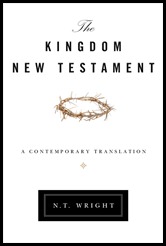We have made it!
One chapter a day, five days a week, every full week of the year. Really, that is a not a lot of reading. But I have a whole string of years where I couldn’t even muster the fortitude to be that disciplined. Maybe you do too. There seems to be something about reading the Bible that creates a challenge even for the most ardent readers.
Yet we did it. And we can be thankful for our seemingly small feat. I know there are big, monumental experiences that shape us in significant ways. But more often than not I find we are formed as humans by our little habits, small victories, excusable vices, short lines in sand, and tiny changes.
As far as blogging is concerned, I don’t know yet what next year brings. I will keep my personal, periodic blog going, but this blog comes to an end today, though all posts will stay up and accessible and the comments will stay open. This is now two consecutive years I have written a blog of this sort — two years ago with the Qur’an and this past year with the New Testament. I do not have plans to undertake a project like this for this upcoming year. I have discerned that it is best for me to spend time with physical and domestic health instead. I am drawn to The Message again, the translation I almost used this year, before N. T. Wright published The Kingdom New Testament, his interesting but not significantly different translation. I hope to keep reading on the same schedule but without the writing. Maybe one of you will find value in a writing discipline like this and invite us to join you next year?
As you might expect from a teacher, I would like to end with a question. Not all of you have wanted to post comments this year and that has been fine. Do consider posting on this one.
What have you learned from a year spent reading God’s Word to the Church?
I share three reflections I have had several times this year. I look forward to your thoughts as well.
1. For many of us, there is no better spiritual practice than reading the Bible. Spiritually, people are wired differently. Some are shaped strongly my worshipful experiences. Some have been turned into  who they are by fervent, honest prayer. Others become different people through service to those they love and those in need. For many, though, the regular practice of Bible reading is the number one shaping influence in their spiritual growth. This is where the Gospel, in its many forms, speaks good news into the vagaries of our life. This is where we are confronted by words that have been read — spoken, really — and therefore cannot be ignored. This is where our minds of flesh are turned spiritual. Almost without exclusion, those I respect the most spiritually all have one thing in common: they read their Bibles. In a million different ways. But they read. And I want to be one of these same people, so I read. When one truly gives him- or herself to the words of the Bible as we have done this year, we are not left the same person. Sometimes, like echoes bouncing around in the chasms of our hearts and minds, those words hit us months later, but the word of God is “alive and active” (Hebrews 4:12). These words do not “return void” (Isaiah 55:11).
who they are by fervent, honest prayer. Others become different people through service to those they love and those in need. For many, though, the regular practice of Bible reading is the number one shaping influence in their spiritual growth. This is where the Gospel, in its many forms, speaks good news into the vagaries of our life. This is where we are confronted by words that have been read — spoken, really — and therefore cannot be ignored. This is where our minds of flesh are turned spiritual. Almost without exclusion, those I respect the most spiritually all have one thing in common: they read their Bibles. In a million different ways. But they read. And I want to be one of these same people, so I read. When one truly gives him- or herself to the words of the Bible as we have done this year, we are not left the same person. Sometimes, like echoes bouncing around in the chasms of our hearts and minds, those words hit us months later, but the word of God is “alive and active” (Hebrews 4:12). These words do not “return void” (Isaiah 55:11).
2. The Bible is always best understood when read and interpreted together. Blogs have long been cited as tools that have overly-democritized the marketplace of ideas. Whether you are 8 or 80, you can create a blog and post your ideas. Then search engines put all search results side by side by topic, not knowledge or research or experience or anything else. That is why the best blogs always have a robust community of readers and comment-makers so as to raise the discussion past the opinions of the one author. That is what I was hoping we could produce here. Likewise, Protestants (as most of us reading this blog are) have always made much-ado about the “priesthood of all believers” and the importance of the Bible. Put them together and we all feel like we can read the Bible by ourselves and our personal  interpretations have equal authority. For sure, all should read their Bibles and all perspectives should be considered, but the interpretations that are hammered out in groups of people are almost always better than what individuals come up with themselves. That is the value of Bible classes in church contexts. That is why we read other people’s books. That is why education has (until lately) always been a communal undertaking. I am extremely thankful to all of you who have taken the time to read my posts. I am even more thankful to those of you who took time to comment and ask questions and bring up alternate viewpoints (and not all of this was done on this blog; sometimes it was at school or church). I have learned from you, and where “iron has sharpened iron” our understanding of the Bible has become that much better. From here on out, I always want to read my Bible with others.
interpretations have equal authority. For sure, all should read their Bibles and all perspectives should be considered, but the interpretations that are hammered out in groups of people are almost always better than what individuals come up with themselves. That is the value of Bible classes in church contexts. That is why we read other people’s books. That is why education has (until lately) always been a communal undertaking. I am extremely thankful to all of you who have taken the time to read my posts. I am even more thankful to those of you who took time to comment and ask questions and bring up alternate viewpoints (and not all of this was done on this blog; sometimes it was at school or church). I have learned from you, and where “iron has sharpened iron” our understanding of the Bible has become that much better. From here on out, I always want to read my Bible with others.
3. The New Testament is a whole lot simpler than we sometimes let it be. I saw this repeatedly throughout the year, but especially in our reading of Revelation this last month. We have tended to make the Bible much more complicated than it really is. I think this usually comes when we isolate small phrases or passages and neglect the big picture. I understand why that happens. We all agree on that big picture, so we focus on the patches of disagreement that we find as we read because those are the things we feel we have to iron out. Then we make those points of argument reasons for disunity and suspicion. I completely understand the aggressive desire for truth in all things, but after this year of looking at the big picture of Christian Scripture I am all the more committed to continuing to do so. With time I have found that small passages of confusion or points of contention work themselves out when we stay focused on the big picture. I know that one of Jesus’ greatest desires is for Christian unity (John 17:20-21), so I am going forward from here today with the belief that anchoring myself in the Story of God’s good news to the world, not pet doctrines or favorite passages within a denomination, has a better likelihood of creating unity.







































Recent Comments